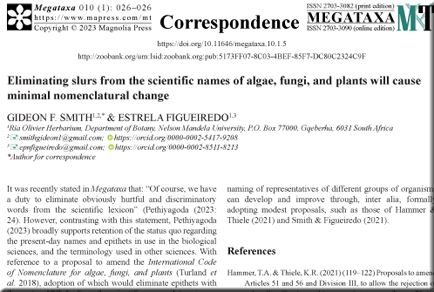Abstract
It was recently stated in Megataxa that: “Of course, we have a duty to eliminate obviously hurtful and discriminatory words from the scientific lexicon” (Pethiyagoda (2023: 24). However, contrasting with this statement, Pethiyagoda (2023) broadly supports retention of the status quo regarding the present-day names and epithets in use in the biological sciences, and the terminology used in other sciences. With reference to a proposal to amend the International Code of Nomenclature for algae, fungi, and plants (Turland et al. 2018), adoption of which would eliminate epithets with the root ca[f]f[e]r- from the scientific nomenclature in use for algae, fungi, and plants (Smith & Figueiredo 2021), Pethiyagoda (2023: 21) further stated that: “They [Hammer & Thiele (2021)] cite, for example, a proposal by Smith & Figueiredo (2021)”. This statement is not correct. Both Hammer & Thiele (2021) and Smith & Figueiredo (2021) were published on “15 December 2021”, and Hammer & Thiele (2021) could not have cited Smith & Figueiredo (2021). To prevent any misconceptions that might result from Pethiyagoda’s statement, we here note that Hammer & Thiele (2021) and Smith & Figueiredo (2021) were not aware of each other’s work until it was published.
References
Hammer, T.A. & Thiele, K.R. (2021) (119–122) Proposals to amend Articles 51 and 56 and Division III, to allow the rejection of culturally offensive and inappropriate names. Taxon, 70 (6), 1392–1394. [First published: 15 December 2021.] https://doi.org/10.1002/tax.12620
Pethiyagoda, R. (2023) Policing the scientific lexicon: The new colonialism? Megataxa, 10 (1), 20–25. https://doi.org/10.11646/megataxa.10.1.4
Smith, G.F. & Figueiredo, E. (2021) (126) Proposal to add a new Article 61.6 to permanently and retroactively eliminate epithets with the root caf[e]r- or caff[e]r- from the nomenclature of algae, fungi and plants. Taxon, 70 (6), 1395–1396. [First published: 15 December 2021.] https://doi.org/10.1002/tax.12622
Turland, N.J., Wiersema, J.H., Barrie, F.R., Greuter, W., Hawksworth, D.L., Herendeen, P.S., Knapp, S., Kusber, W.-H., Li, D.-Z., Marhold, K., May, T.W., McNeill, J., Monro, A.M., Prado, J., Price, M.J. & Smith, G.F. (2018) International Code of Nomenclature for algae, fungi, and plants (Shenzhen Code) adopted by the Nineteenth International Botanical Congress Shenzhen, China, July 2017. Koeltz Botanical Books, Glashütten, [Regnum vegetabile 159], 254 pp. https://doi.org/10.12705/Code.201

